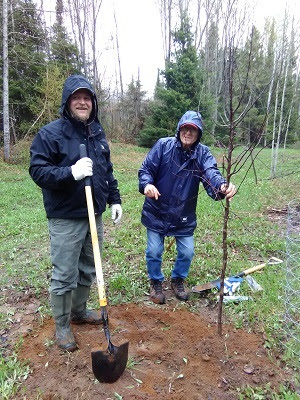 |
| Ricky Eckloff, of Skandia, joined in a tree-planting event in the Gwinn State Forest. |
A habitat improvement program focused on Michigan wildlife and fostering stewardship between volunteers and their public lands celebrated its 2,500th volunteer over the weekend.
Since 2013, On the Ground (OTG), administered by Michigan United Conservation Clubs through funding from the Michigan Department of Natural Resources Wildlife Division, has accumulated more than 8,000 volunteer hours through 128 projects and positively impacted 1,668.8 acres of public land throughout Michigan.
Started as a way to connect people with the often under-utilized public land around them, OTG has now grown into one of the most successful volunteer-based habitat programs in the country. From picking up rocks to make fields tillable to building rabittat, a term OTG coined, the program has traveled to all corners of the state and taken on a whole gamut of habitat projects.
Ricky Eckloff, of Skandia, joined OTG and the Michigan Ruffed Grouse Society Saturday for a tree-planting event at a Grouse Enhanced Management Site (GEMS) in the Gwinn State Forest and was the program’s 2,500th volunteer.
 |
|
“As a scoutmaster and outdoorsman, I understand the importance of volunteers and the positive impact they can have,” Eckloff said. “OTG events like this give like-minded people the opportunity to work together in the name of conservation, and I’m happy to be a part of that.” MUCC Habitat Volunteer Coordinator Makhayla LaButte said enhancing Michigan’s public lands for game and non-game species alike is a win-win for everyone. “OTG gives volunteers the opportunity to actively engage with their resources beyond traditional consumptive uses like hunting or angling,” LaButte said. “Our program engages everyone from dedicated sportsmen and women to leisurely recreationists and gives Michigan citizens the opportunity to give back to their natural resources.” Although project scopes often have an immediate impact on game species, non-game species and pollinators also benefit from OTG projects. Past projects include building hunter-access boardwalks, planting mast-producing trees, cleaning up parking lots and rivers, building wood duck boxes, planting native grasses and removing invasive species like garlic mustard and autumn olive. |
 |
|
In 2016, OTG expanded to include OTG Jr. — a field-trip-based program where teachers and coordinators try to incorporate their classroom curriculum into hands-on learning. After each habitat project, students are then able to fish, shoot a bow or participate in waterfowl or mammal identification to try and marry what they learned about habitat improvement to the species that benefit from OTG projects. The program is funded through a memorandum of agreement with the Michigan Department of Natural Resources Wildlife Division, and it has been vital to helping the department achieve and expedite habitat goals, said DNR Wildlife Division Chief Russ Mason. “On The Ground is a nationally recognized program that strengthens ties between the public and DNR’s Wildlife Division. It provides a real cadre of citizen volunteers that accomplish projects that might otherwise not get done,” Mason said. “At the same time, OTG educates adults and kids about the importance of managed habitats as the foundation of Michigan’s wildlife conservation efforts.” OTG’s success also rests heavily on the outdoor heritage all Michiganders share, said MUCC Executive Director Amy Trotter. |
 |
“We all have hunting and angling in our blood, and hunters and anglers are at the forefront of conservation throughout the United States,” Trotter said. “OTG provides a unique opportunity for those not involved in the outdoor world to engage with the gatekeepers of it.”
There is a major difference between talking about getting habitat work done and actually doing it, DNR Wildlife Division Regional Supervisor Terry Minzey said. Minzey is responsible for oversight of Michigan’s Upper Peninsula.
“A lot of people talk about what should be done; MUCC is out there getting it done,” Minzey said. “[This] is work that wouldn’t have gotten done otherwise … that’s 10 years of one employee’s time.”
Looking ahead, OTG has at least nine more projects planned throughout the summer months ranging from river clean-ups to tree plantings. For a complete list of projects near you and how to get involved, visit mucc.org/on-the-ground/.
Michigan United Conservation Clubs is a nonpartisan, nonprofit organization who is committed to uniting citizens to conserve, protect and enhance Michigan's natural resources and outdoor heritage.
Contact: Nick Green (MUCC), 517-346-6486 or Russ Mason (DNR), 517-243-8928
